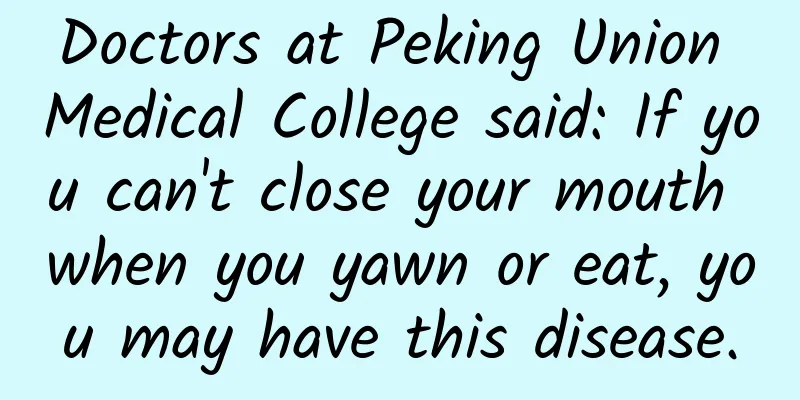Doctors at Peking Union Medical College said: If you can't close your mouth when you yawn or eat, you may have this disease.

|
On an ordinary weekend morning, Xiao Zhang was about to take a bite of an ordinary pancake, but suddenly found that he couldn't open his mouth. He opened his mouth with difficulty, but found that half of his face hurt when he chewed. Xiao Zhang thought about the pancake for a long time: Did he... lose his jaw? A dentist from Peking Union Medical College Hospital reminded: If Xiao Zhang frequently suffers from mandibular dislocation, he may be suffering from temporomandibular disorder (TMD). What is TMD? Temporomandibular disorders (TMD), also known as temporomandibular joint disorders, are oral joint diseases with an incidence rate of about 25%. Among common oral diseases, TMD ranks fourth, with more women suffering from the disease than men, and young people being the main group suffering from the disease. What symptoms might indicate TMD? ① Noises are produced by opening and closing the mouth; ② Jaw stuck, limited opening and closing of the mouth; ③ Mandibular dislocation; ④Pain in the head, face, neck and shoulders. Why do I get TMD? The cause of TMD is still unclear, but it is generally believed to be mainly the following: 1 Predisposing factors ① Disordered occlusion; ② Abnormal development of the oral and maxillary system (inconsistency between the size of the condyle and the fossa, etc.); ③ Bad oral habits: bruxism, chewing on one side of the jaw, etc.; ④Psychological aspects: anxiety, depression, etc. 2 Predisposing factors ① Trauma to the head and face; ② Overload of the oral and maxillofacial system: yawning, excessive opening of the mouth due to chewing food, injury caused by biting hard objects, prolonged opening of the mouth, long-term dental treatment, and bad oral habits; ③ Pain stimulation, such as the pain stimulation of wisdom tooth pericoronitis; ④ Environmental stimulation, such as cold stimulation, stress and mental trauma caused by life events. 3 Sustainability Factors Including psychological, metabolic and immune factors. I have TMD and suffer from habitual dislocations, what should I do? In order to effectively alleviate the habitual dislocation caused by temporomandibular joint disease, the Department of Stomatology of Peking Union Medical College Hospital developed a posterior teeth decompression bite plate (which has been granted a national patent). Compared with other treatment methods (such as bandage immobilization, injection of botulinum toxin to paralyze muscles, surgical resection of related bones, etc.), the use of posterior tooth decompression bite splints is simple to operate, quick in effect, non-invasive and non-destructive. In the past three years, more than 50 patients have been treated with posterior tooth decompression bite splints without recurrence of dislocation. **When using a posterior teeth decompression bite splint,** what should I pay attention to? ①The patient needs to wear it by himself before going to sleep at night; ②Regular follow-up examination: follow-up examination every three months; ③ Pay attention to daily cleaning: Use effervescent tablets specially made for dentures for cleaning, do not use hot water, and avoid brushing with a toothbrush. Which patients can use posterior teeth decompression bite splints? The posterior teeth decompression bite splint is not only effective for patients with habitual mandibular dislocation, but can also be widely used in other types of patients with internal and external disorders of the temporomandibular joint capsule, such as patients with reducible disc displacement, irreducible disc displacement, and mandibular joint degeneration, and has varying degrees of therapeutic effect. In the future, Union Medical College Stomatology Department will also integrate the posterior teeth decompression bite plate into the invisible orthodontic correction technology through digital processing to help solve the complications of temporomandibular joint disease in orthodontics. Author: Wang Qi Chief physician of the Department of Stomatology, Peking Union Medical College Hospital. Specializes in orthodontics, orthognathic and orthodontic treatment, non-surgical correction of neonatal cleft lip and palate, conservative treatment of temporomandibular joint disease, and preparation of snoring devices. Audit expert: Zhou Lian Deputy Chief Physician of the Department of Stomatology, Peking Union Medical College Hospital. Specializes in surgical treatment of cleft lip and palate, surgical correction of dentofacial deformities, surgical treatment of oral and maxillofacial trauma, and oral and maxillofacial tumor treatment. Content from: Wang Qi, a doctor at Union Medical College Hospital |
>>: What should babies pay attention to in their diet for pneumonia?
Recommend
Pregnancy lower abdominal pain
It is possible to experience lower abdominal pain...
How long can pubic lice live?
Pubic lice are a type of insect that usually appe...
What is the cause of the odor in the lower body of pregnant women?
Women's physiological phenomena are very spec...
Why do I not have my period after curettage?
Lightening is a treatment technique of curettage ...
How to take care of endometriosis?
As the name suggests, the endometrium is the memb...
The rainy season is coming, be careful of these skin diseases!
This is the 4996th article of Da Yi Xiao Hu 1. Fu...
Home rehabilitation for elderly people with dementia
It is estimated that by 2050, the number of peopl...
How long after a caesarean section can you take a shower? Pay attention to the time
Caesarean section is the process of helping the m...
Can fennel dumplings reduce milk production?
Fennel is a food that we can all eat, but it is n...
Jiao Yang: New regulations issued to strengthen import and export food safety
Jiao Yang, Professor-level Senior Engineer Vice C...
How much does cervical cancer screening cost?
Cervical cancer is a very scary disease for women...
When is the best time to have an abortion?
Unexpected pregnancy is now a very common phenome...
Will wearing glasses for a long time cause my eyesight to worsen?
When Zhang Zifeng participated in a variety show,...
Sugar in fruits, table sugar, and sugar substitutes, which one should be quit the most?
Author: Cui Yihui, registered dietitian, master o...
Can I test positive for pregnancy if my period is delayed by one day?
We all know that once a woman becomes pregnant, i...









